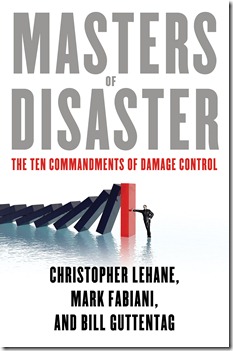My Interview With The "Masters Of Disaster"
Editor’s Note: Today’s post is an interview with Christopher Lehane and Mark Fabiani, co-authors of “Masters of Disaster,” their excellent new book about the best ways to manage a media crisis.
Question One: I’ve dealt with cases in which doing the “right” thing for the larger brand was a “bad” thing for the executive in middle of the storm. How do you convince intransigent executives that it’s right for them to take a personal hit for the good of the larger organization?
If a key executive is so exposed by a crisis that his or her departure is necessary to help the company, then that executive’s departure is highly likely to be inevitable. The only question is how much damage the company and the executive suffer between the time of the crisis and the time of the inevitable departure.
One of the skills of a top crisis manager is the ability to help clients see around corners. In the case of an embattled executive, the goal is to peer around the corner and explain in a compelling way why the end result is inevitable and why acting quickly will save both the executive and the company from unnecessary harm.
Question Two: In my book, The Media Training Bible, I advise that people in crisis should usually say something in the first hour after a crisis breaks, even if it’s only to say that you’re aware of the event and are looking into it. You seem to disagree with that, saying that “some confuse speed with efficacy.” If you disagree with my conclusion, what advice would you offer your clients?
The simple acknowledgement of a crisis in the first hours is generally a safe move. But most company executives find it hard to stop with the simple acknowledgement. They feel pressured by their Board of Directors, or the financial markets, or the media, or all of the above, to say something more that will stem the tide. And that is where speed is confused with efficacy. Legions of executives have failed in crisis situations by staking out positions and offering facts that were unable to stand the test of time.
Question Three: Related to that, you write that the “pivot point moment usually does not come in the opening moments of a crisis.” But if you wait too long, the narrative can get out of control and become virtually impossible to reverse. How can people know when they simply can’t wait any longer to respond?
If a simple formula existed to answer to this question, no one would need to hire us. This is one of the most critical judgment calls that an executive will be called upon to make during a crisis situation, and in making that call there is no substitute for the experience that comes with having lived through and successfully managed many of these situations.
Question Four: I agree with your conclusions regarding David Letterman and Tylenol (ed note: that they both handled their crises well) – but both of them had the advantage of a third party that was more of a “bad guy” than they were. Wouldn’t those cases have been trickier if Letterman hadn’t been extorted and the Tylenol capsules had been poisoned by an insider instead of an outsider? Or do you think they could have both come out as clean as they did with the right type of crisis management?
You are right that these cases would have been trickier to handle given different facts. But, in the end, the basic principles that were employed by the crisis managers in these cases were so fundamentally sound and so effectively applied that success was likely even with more difficult facts.
Question Five: Joe Paterno famously alienated what you call his “bull’s eye”—Penn State’s Board of Trustees—when he released a self-serving statement that wasn’t coordinated with them. Would you disagree with my alternate premise that it could have worked the other way, as well—that he could have rallied the public to his side, allowing the Board to continue supporting him?
Just as with so much else in life, timing is everything in crisis management. If Paterno had weeks of time to mount a campaign on his behalf, then perhaps his statement could have successfully kicked off that campaign. But in this case the Penn State Board was going to act quickly. That was a fundamental fact that Paterno’s advisors had to realize. And in the face of imminent action, one way or the other, by the Board, Paterno’s unilateral statement was far more likely to alienate the Board than achieve any other purpose. And that’s exactly what happened.
Question Six: You discussed the “new imperatives of rapid response,” which means, “getting in front of the news, hitting back harder than you have been hit, and pre-butting the attack.” How do you deal with a politician who’s already personally unpopular – and whose hard-hitting response may further alienate potential voters?
This is one of the most difficult issues for campaign strategists. Oftentimes the best arguments against an opponent are ones that your candidate cannot for one reason or another make directly. And so you search for other ways to make the argument: through third parties, in advertising, with indirect messaging, and so forth. But, in the end, both reporters and voters are generally unwilling to do your hard work for you. If the argument is so compelling, they say, why aren’t you making it yourself? And they’re right. So sometimes candidates, even ones who are personally unpopular, have no choice but to make important arguments directly, because if they don’t, the arguments are unlikely to get made at all.
We faced exactly this situation during the Gore-Bush presidential campaign in 2000. Polling showed that many swing voters did not like it when Vice President Gore attacked his opponent, which caused some in the campaign to discourage Mr. Gore from questioning Mr. Bush’s experience and competence to be President and decide issues of war and peace on behalf of the people of the United States. And while third parties made this argument on the campaign’s behalf, they simply were no substitute for Al Gore flat out saying “I’ve got the experience and judgment to do this job, and you, with all due respect, don’t.” Given what happened in the eight years that followed, there are surely many people who wish that Mr. Bush’s experience and competence had received more attention during the 2000 campaign.
Question Seven: You’ve represented some famous people, notably Bill Clinton and Lance Armstrong, who didn’t always follow the good advice in your book. Without breaking any client confidences, can you tell me how your experiences with clients who didn’t always follow “best practices” ultimately informed your view of crisis communications?
With the understanding that I am not addressing the situation of any particular client here, there are of many reasons why clients might not follow advice: Family reasons, financial considerations, legal reasons, and so forth. That is why it is so difficult for observers to judge how well a crisis is being handled, without a full understanding of all of the factors involved.
Question Eight: Finally, I noticed that you used a fair bit of violent imagery to describe crisis communications (e.g. blood oozing from various orifices, knife fight in a telephone booth, a shield and a sword, live ammo, a raw piece of red meat to a pack of wild and hungry dogs). What, if anything, does that tell us about your view of crisis communications?
Crisis management is win or lose, prevail or be defeated. There are seldom any in between situations, and perhaps that is why the imagery you noticed is appropriate.
Masters of Disaster is available in hardcover here and for the Kindle here. You can read my review of the book here.





